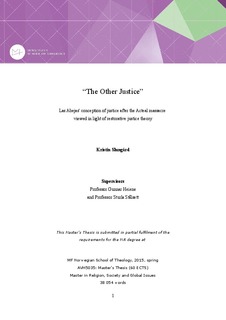"The Other Justice". Las Abejas' conception of justice after the Acteal massacre viewed in light of restorative justice theory
Master thesis
Permanent lenke
http://hdl.handle.net/11250/293633Utgivelsesdato
2015-07-27Metadata
Vis full innførselSamlinger
Sammendrag
Las Abejas formed as an organization in 1992 as a indigenous, Catholic, pacifist organization, working for peace and indigenous rights in Chiapas, Mexico. This group is in solidarity with the Zapatistas who uprose against the government in 1994. The 22nd of December 1997, 45 of the members of Las Abejas were killed by a paramilitary group while fasting and praying for peace. This incident came to be known as the Acteal massacre. This study explores Las Abejas' active pursuit for justice after the Acteal massacre. It examines their conception of justice and their concrete ways of acting to obtain justice in their communities. Their understanding of justice is analyzed in light of restorative justice theory. The study is based on documents by the head board of the organization as well as on interviews with people who work or have worked with Las Abejas in different ways. Las Abejas conception of justice, which they refer to as “The Other Justice” will be viewed as based on their identity as a resistance movement, which is grounded in their indigenous, religious, pacifist and global identity. Four elements appeared as essential in their conception of justice after the Acteal massacre: justice as a form of punishment, as truth, as in need for autonomy and as a structural issue.
